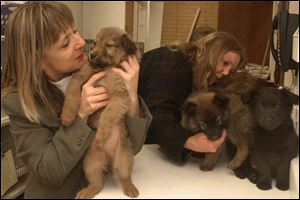
Patrol aims to save `free' pets
4/14/2003
Volunteer Karen Latta, left, and Kathy Kozak, Planned Pethood president, calm puppies before they receive a checkup at the Total Pet Care facilities on Briarfield Boulevard in Maumee's Arrowhead Park.
Newspaper classifieds are full of notices offering newborn puppies and kittens “free to a good home.”
But free puppies and kittens can end up sold to medical labs, used to train fighting dogs, or fed to pet snakes. “A lot of times, `free to a good home' is a death sentence,” said Kathy Kozak, Planned Pethood president.
Planned Pethood, a nonprofit group based in Swanton, recently started a program called Litter Patrol to assure these baby animals find safe homes.
Volunteers scan local newspapers for listings of free puppies and kittens. Then they contact the owners and explain how Litter Patrol works.
If owners agree to participate, volunteers pick up the puppies or kittens and place them in foster homes until they are adopted permanently. Planned Pethood also spays or neuters all adult pets in the home and returns them to the owners.
“We're going right to the heart of the problem,” volunteer Karen Latta said.
Since the program began in February, Planned Pethood has taken in 36 puppies and 29 kittens. Most have been adopted. The group makes sure pets have veterinarian care and get spayed or neutered before they are eligible for adoption.
The Litter Patrol also spayed or neutered 17 adult dogs and 11 adult cats that are remaining with their owners. Planned Pethood pays for the operations.
“Some owners are a little apprehensive at first when we call,” Ms. Kozak said. “But once we explain what we're doing, they get really excited and grateful for the help. Lots of people want to do the right thing by spaying or neutering their pet, but they don't have the resources.”
Planned Pethood volunteers said some people take in strays because they hate to see the animals suffer. If they can't afford to have all their pets spayed or neutered, owners end up with generations of pets they can't support.
So far, the program has helped owners in North Toledo, East Toledo, and the old South End.
Planned Pethood allocated $6,000 to Litter Patrol for three months. The money mostly pays for spaying or neutering adult pets.
Each operation costs the group $28 to $42 for cats and $40 to $72 for dogs. Planned Pethood works with area veterinarians that offer the operations at a discount.
The cost of spaying or neutering is largely covered by adoption fees, which are $65 for cats and $100 for dogs. In addition to paying for veterinary care, the fees help ensure that adopters really want a pet.
“We're keeping all these free puppies and kittens out of the wrong hands,” Ms. Latta said.